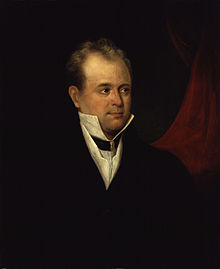Richard Carlile
| Richard Carlile | |
|---|---|
 |
|
| Born |
8 December 1790 Ashburton, Devon, England, United Kingdom |
| Died | 10 February 1843 (aged 52) London, England, United Kingdom |
| Occupation | Publisher |
Richard Carlile (8 December 1790 – 10 February 1843) was an important agitator for the establishment of universal suffrage and freedom of the press in the United Kingdom.
He was born in Ashburton, Devon, the son of a shoemaker who died in 1794 leaving Richard's mother struggling to support her three children on the income from running a small shop. At the age of six he went for free education to the local Church of England school, then at the age of twelve he left school for a seven-year apprenticeship to a tinsmith in Plymouth.
In 1813 he married, and shortly afterwards the couple moved to Holborn Hill in London where he found work as a tinsmith. Jane Carlile gave birth to five children, three of whom survived.
Some time after 1829, Carlile met Eliza Sharples and she became his common law wife. Together they had at least four children.
His interest in politics was kindled first by economic conditions in the winter of 1816 when Carlile was put on short-time work by his employer creating serious problems for the family: "I shared the general distress of 1816 and it was this that opened my eyes." He began attending political meetings where speakers like Henry Hunt complained that only three men in a hundred had the vote, and was also influenced by the publications of William Cobbett.
As a way of making a living he sold the writings of parliamentary reformers such as Tom Paine on the streets of London, often walking "thirty miles for a profit of eighteen pence". In April 1817 he formed a publishing business with the printer William Sherwin and rented a shop in Fleet Street. To make political texts such as Paine's books The Rights of Man and the Principles of Government available to the poor he split them into sections which he sold as small pamphlets, similarly publishing The Age of Reason and Principles of Nature. He issued unauthorized copies of Southey's Wat Tyler and after the radical William Hone's arrest in May, he reissued the parody of parts of the Book of Common Prayer for which Hone was to be tried, then was himself arrested in August and held without charge until Hone was acquitted in December.
...
Wikipedia
